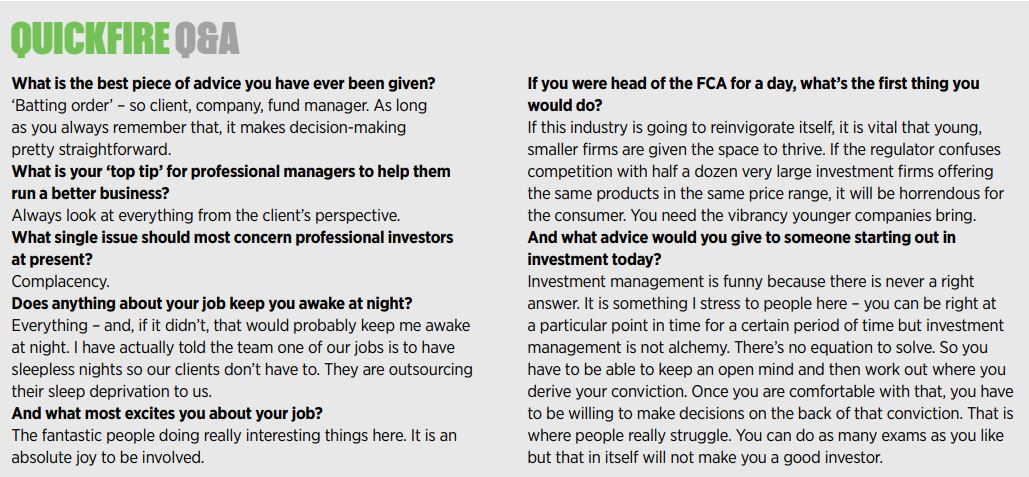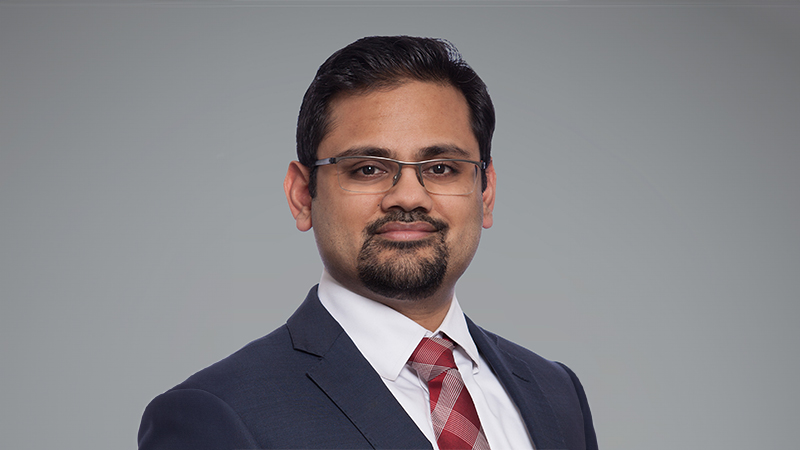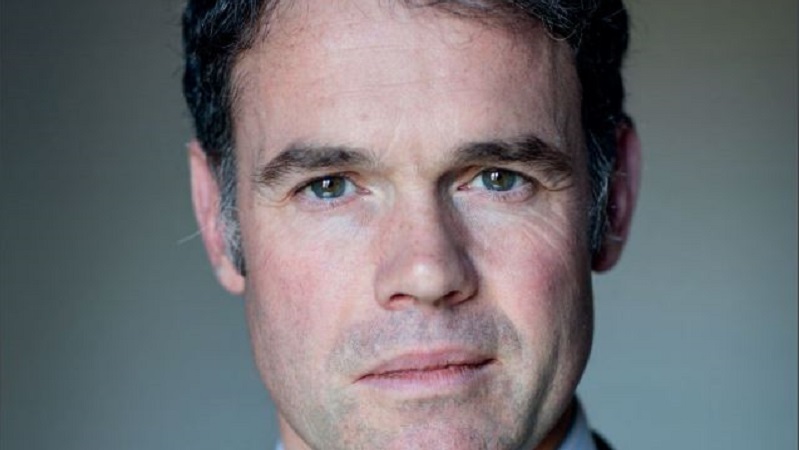Diversification tends to be touted as a virtue across the asset management sector but, to Alex Odd’s eyes, many groups are not practising what they preach when it comes to their business models.
“I find the trend towards consolidation and homogenisation in our industry quite disturbing,” says the chief executive of Tyndall Investment Management. “Often it is done for the ease of some of the larger firms rather than to the benefit of the underlying client. It is one of the great threats we are faced with as an industry – that people become so obsessed with taking the plain vanilla, straightforward investment route that they forget our job is actually about delivering an outstanding service to the underlying client.”
Not that Odd, who founded Tyndall at the end of 2016, seems too despondent. “In my experience, these things are cyclical,” he adds. “Trends ebb and flow and, increasingly, clients are growing disillusioned with these homogenised processes. Instead, they are now looking for businesses that are prepared to cherish them rather than merely treating them as a tradable commodity.”
From PwC to income fund manager to chief executive
Such a view is not entirely unexpected, coming as it does from the chief executive of a relatively new asset management business – a role Odd arrived at via the less-travelled fund managerial route. Having started his career at PriceWaterhouseCoopers, he served as Tony Nutt’s deputy on the flagship Jupiter Income Trust in the late 1990s and early 2000s before running the similarly high-profile M&G Dividend Fund himself for a decade.
Does that influence Odd’s approach to managing a company? “If you have run money, then you always run a business with that mindset and will be very supportive of the investment managers,” he replies. “Indeed, I am probably biased towards investment managers over distribution – and two things flow from that. First, it means the investment culture within Tyndall is incredibly strong – it is, without doubt, the dominant force.
“On the other hand, we always have to be careful not to spend too much time thinking, if we build something, people will come – which is why the distribution part of the business is so important. My background means the emphasis on what connects clients and investment managers – in short, performance – is absolutely foremost because delivering a fantastic product is what drives distribution.”
‘Good fund managers have to have the freedom to make decisions’
Speaking from experience, then, what quality contributes most to the perfect environment for fund managers? “Freedom,” Odd replies. “Good fund managers have to have the freedom to make decisions – while knowing they will be held accountable for them. What you need is good people with very high levels of conviction and conviction does not come from committees or from analyst teams – it comes from the individual.
“Conviction is an indivisible thing and so you have to provide an environment where people feel confident they can express their convictions in a portfolio.” As Odd goes on to acknowledge, there is a fine line between accountability for investment decisions and blame.
“If your fund managers and investment managers are not making mistakes sometimes, then clearly they are not trying,” he points out
“So underperformance that can be understood and contextualised in terms of their investment process, their views and their mindset – that I am extremely comfortable with. If, however, there was anyone here saying, I cannot understand why I have had a rubbish three years because I reckon I’m doing a brilliant job … they might have to find somewhere else to work.”
‘It is a very unusual environment because everybody wishes each other well’
Given Tyndall is such a young business, how has it fared over the past few years when governance and liquidity have reasserted themselves as a major focus for investors? “Let’s do governance first because that has been so important to us as a young company,” says Odd. “After all, three years ago, we had a million quid or so of assets under management and were trying to persuade people we were a fantastic place either to work or be a client.
“Weirdly, though, rather than being a complication, the governance piece was a major competitive advantage for us because of the ownership structure of the business. As it is owned by the team, there are no external pressures on the business – no demands to deliver targets for third-party shareholders or anything like that. Our clients really respect that because it means they know everybody is pointing in the same direction.
“There is no trade-off between clients, shareholders and management – everybody is trying to achieve the same thing because we all know we grow by word of mouth and our reputation in the marketplace. As a result, we are very open about how the business is run and what we are trying to achieve. And this is a collegiate effort – it is not about me or Felix Wintle or Richard Scrope or Simon Murphy, it is about all of us working together.
“No one person is more important than anybody else – and essentially what that means is there are no egos. It is a very unusual environment because everybody wishes each other well. If, say, Felix has a great year, then everybody benefits from that. It is not a zero-sum game, which is what tends to happen with the larger firms, and that makes for a very powerful culture.”
As for liquidity, Odd sees this as a more nuanced point, explaining: “This is something the market sometimes struggles with. Take Tyndall as an example: we run some quite small funds but I would argue – and indeed it is demonstrably the case – that a small fund that invests in liquid assets is considerably more liquid than a very large fund.
“So the fact the market confuses size with liquidity is a little baffling to me. Fund selectors will know better than I do the knots the open-ended property fund market has tied itself in here – and still people struggle to get their heads around that. To be honest, in a few years’ time, investors could be equally astonished when there are liquidity issues in some of the very large bond funds.”
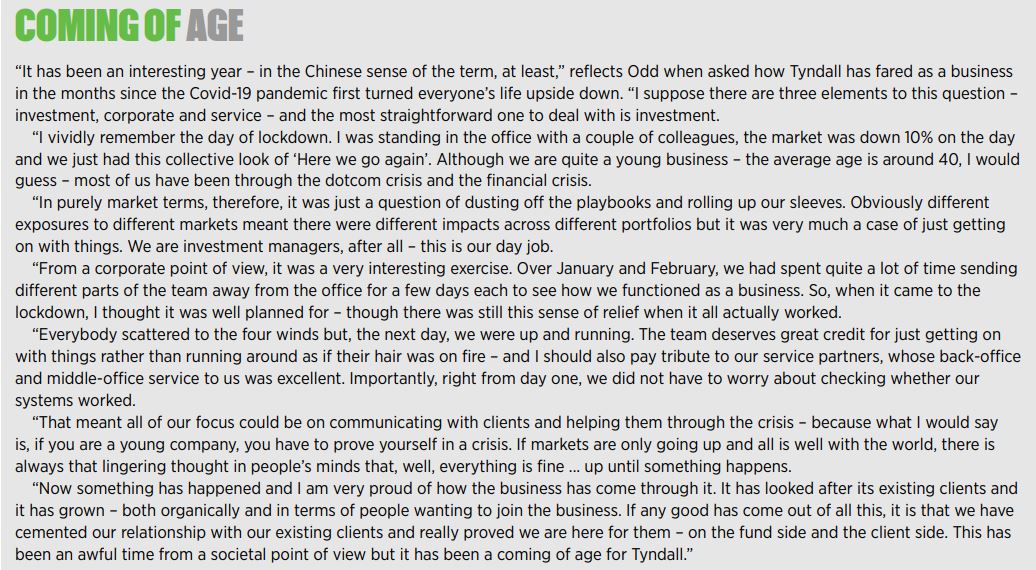
‘I think of Tyndall as predominantly an equity house’
Since we have moved to the subject of different assets, does Odd believe end-investors and, by extension, their advisers should be thinking beyond the more traditional classes, such as equities and bonds? “My background is in equities and I think of Tyndall as predominantly an equity house,” he replies. “Where we do have bond exposure, we tend to outsource it to people we like and respect.
“Having alternative asset classes, particularly on the private client side, is an important diversifier but investors really must not confuse differentiated asset classes and proper diversification. Good diversifiers are extremely hard work – difficult to find and usually expensive. Almost anything you can buy on a platform has a tendency to have a correlation of one when it all goes wrong at the same time. Sometimes people forget that.”
On the not unconnected matter of passive investing, Odd draws an analogy with intensive chicken-farming, explaining: “That suddenly provided a very cost-effective source of protein for people. Nowadays, one of the ways client portfolios are evolving is investors can gain exposure to extremely low-cost beta – which is also what makes the space for genuinely differentiated active funds.
“Clearly the real problem in the market – and where I feel most sorry for people – is this huge array of bog-standard, plus or minus a bit, index gumph that people charge huge fees on to no discernible benefit for the underlying client. The passives do an excellent job – although I would add that sometimes people don’t fully understand the make-up of the underlying holdings.
“This is particularly true with thematic index funds, where investors can end up having far more highly correlated holdings than perhaps they might have thought – not to mention much more individual stock concentration. You only have to look at the Apple weighting in everything from S&P 500 to technology to ESG-oriented exchange-traded funds – in the end, it would just be easier to buy Apple.”
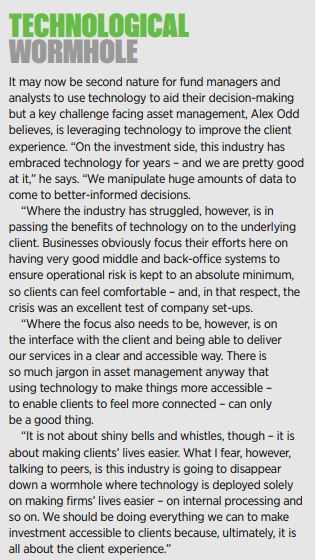
Odd describes ESG itself as “a very powerful force at the moment and obviously one we are extremely supportive of”. “What I would stress, though, is the philosophy that sits behind ESG has been deployed by good fund managers for decades,” he continues. “It is a lot more neatly packaged nowadays and perhaps has more of an emotive and philosophical bent to it.
“Even if it has not been explicitly marketed, though, good investment management has always paid attention to ESG considerations. The idea of most funds being run by evil capitalists with total disregard for ESG is not the case. If you want a really good investment, then it has to be in something that is sustainable and extremely well managed for the benefit of all the stakeholders. That is a cornerstone of making good investment decisions.”
‘Bunch of drunks propping themselves up against each other’
Turning to the trend for what might be described as ‘defensive M&A’, which looked to be heating up before the pandemic struck, Odd offers a much more colourful metaphor. “The first thing I would say is that Tyndall, as a house, is fiercely independent,” he begins. “You do not go to all the effort of setting up a business and drawing in great people just to flip it on to somebody further down the line.
“There is, though, no doubt we are seeing a trend for M&A in asset management. You kindly described it as ‘defensive M&A’ but, to me, there is an element of a bunch of drunks propping themselves up against each other as they stumble home.
“My guess is that some of them will make it and be fine but I fear others will fall flat on their face and make a fool of themselves.
“It is a strange situation because we have touched a few times on consolidation and homogenisation – the wide array of overpriced, boring products that are slightly soul-crushing because they corral clients into frankly bog-standard offerings. And yet, if this was a successful, vibrant industry, where everybody was outward-looking and forward-thinking, it would be much harder for a business like ours to be able to break through.
“As I said earlier, asset management is quite cyclical in terms of ebb and flow so my hope – in fact, my expectation – is that we will see a client-led development where people become more and more fed up with these larger, more complacent businesses and will end up turning to the much more client-oriented, smaller firms.
“In my darker moments, I do worry the industry will just continue to homogenise, will continue to consolidate and, if we are not careful, asset management will end up like the UK banking system.
“And I don’t think anybody wants to see that. Luckily, there are some navel-gazing behemoths that are not really interested in their clients and that is what makes firms like Tyndall possible.”
